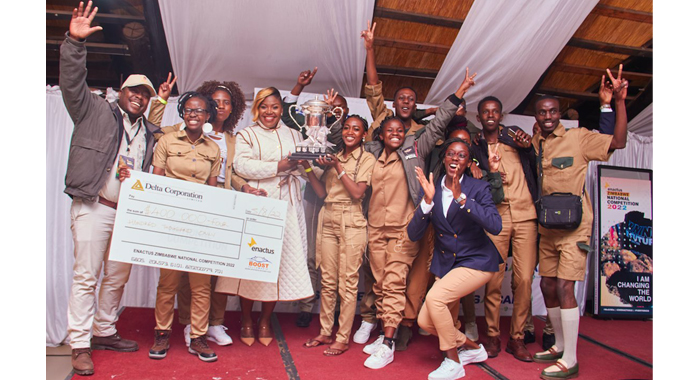WATCH: LSU scores national first with plastic waste to fertiliser innovation

Bongani Ndlovu, Chronicle Reporter
LUPANE State University (LSU) students have come up with an innovative way to turn plastic bottles into a top dressing fertiliser product called “Petilizer”, which they say could contribute towards sustainable agriculture across the country.
The innovative project is part of efforts by students to provide a solution for plastic waste management and enhancing agricultural business in Matabeleland, and more particularly Lupane District.

Lupane State University
Through the innovative breakthrough, the LSU students are also tackling the global Sustainable Development Goals (SDGs) such as ‘No to Poverty’, ‘Zero Hunger’, ‘Decent Work and Economic Growth’, ‘Climate Action’ and ‘Life on Land’.
According to the students, the process can turn 100kgs of PET plastic bottles into 330kgs of fertiliser, through smelting, adding worms and compost.
The students participated in the National Competition of ENACTUS Zimbabwe last week where they showcased the project and scooped the first prize, which came with a Z$400 000 package.

The LSU team at work on the waste plastic to fertiliser project
Boost Fellowship runs the competition under their ENACTUS programme, a platform for teams of college/university students to take entrepreneurial action for others while using business principles and innovation to further global development goals and creating a sustainable positive impact on people, planet and prosperity.
LSU took first place, Midlands State University second, University of Zimbabwe third and NUST fourth in the finals.
Mr Bukhosi Dumoluhle Mpofu, who is LSU faculty advisor, business clinic development manager and lecturer in the Human Capital Development Department also won the Faculty Advisor of the Year award at the same competition.
For their efforts, the LSU team will represent Zimbabwe in the World Cup in Puerto Rico from October 30 to November 3.

Mr Bukhosi Dumoluhle Mpofu
The vice president of the ENACTUS Zimbabwe Lupane, Ms Ayanda Jele said plastic waste has contributed to multiple deaths of cattle in Zimbabwe.
“Plastic waste on plants like sorghum and sudangrass adds a deadly component, cyanide, which builds up in plants that are used for cattle grazing and eventually causes prussic acid poisoning,” she said.
“Lupane District in Matabeleland, not only has been facing this problem but a global pandemic (Covid-19), and water shortages, which have left communities on their knees.”
Ms Jele said through these problems, they saw an opportunity to safeguard the region. After collecting the PET bottles, she said they began the processing stage, which involves, smelting, worms and compost.
“The plastic bottles are first smelted to change the structure and thereafter we weave them and make thin strips. We then added manure, which is rotten foodstuffs collected, mainly from the Lupane State University dining hall,” said Ms Jele.

LSU team holding their awards
“Then we add the Galleria Melonella worms. This worm is our cutting-edge discovery as it eats the plastic and eventually dies and leaves behind solid and liquid biomass, which can be used as a fertiliser or biogas. This can be further broken down into methane and carbon dioxide.”
Ms Jele said the whole process takes about two weeks from the time that they smelt the plastic bottles to the time that the fertiliser is ready.
She said they came up with the innovation due to the somewhat barren soils of the region that LSU is situated in and to fulfil SDG 2, of Zero Hunger.

Ms Ayanda Jele
“We come from a semi-arid region where rainfall is intermittent. We want to allow the crops to survive. Plastic waste has caused problems when it comes to cattle breeding as they die after eating plastics and plastics contaminate plants. And through the Petilizer we want to boost yields,” said Ms Jele.
SDG 2 seeks to ensure that by 2030 there is sustainable food production and implementation of resilient agricultural practices that increase productivity and production, help maintain ecosystems, strengthen capacity for adaptation to climate change, extreme weather, drought, flooding and other disasters and progressively improve land and soil quality.

LSU team member
Ms Jele said they engaged the community to build a smelter where they dug a hole and smelt the plastic bottles.
“We dug a hole in the ground, made a bonfire, put buckets of water to harvest the smoke and we burnt the plastic on the bonfire. It’s a model that can be adopted even in our absence. When we go commercial, we are going to have a smelter,” said Ms Jele.
In a separate interview, Mr Mpofu said their samples are cheaper than the going price of fertiliser in the market.
“Our top dressing is about US$3 cheaper per 10kgs. Ours has 16 percent more nitrogen than normal top dressing and it is environmentally friendly as we aren’t using any chemicals in it. The packaging we intend to use is easily recyclable and biodegradable,” he said.
“So, with 100kgs of PET Bottles, we can produce 330kgs of fertiliser. The production price is US$4,50 and we have a 30 percent markup that takes it to US$5,85 per 10kg. Normally top dressing is US$35 to US$45 per 50kg bag and we are cheaper.”

Mr Mpofu said they were selling samples and are awaiting approval to go commercial.
“For now, what has happened is that we are still to register with the Standards Association of Zimbabwe and we are awaiting our MoUs with EMA and Agritex,” he said.
“The aim at the end of the day is to create employment and reduce hunger according to the different SDGs. As long as the community is involved and is benefitting when we go commercial, we aim to be able to employ the community.”
Mr Mpofu said when they go commercial the innovation will be handed to the community to run it.
He was in charge of bringing into fruition the innovation, which is the culmination of a collaboration between students studying various degrees such as marketing, accounting animal breeding and biotech, developmental studies, entrepreneurship and procurement and supply.

LSU team member
The students in marketing management are Letwina Amanda Hove, Bunake Ncube, Farai Mapuvire, Ashel Mangoro, Tawana Dube, Lindelwe Jojo Maphosa, Prince Sibanda, Herbert Dzwairo, Ashton Machokoto and Tendai Murombo.
Others are Ayanda Jele studying entrepreneurship, Bhekumuzi Nyathi – accounting and finance, Jessica Pullen – Masters in Animal Breeding and Biotech, Praise Lord Paradza – procurement and supply, Ornate Sisasenkosi Sibanda – economics and Nkosilamandla Kunene who is doing development studies.











Comments